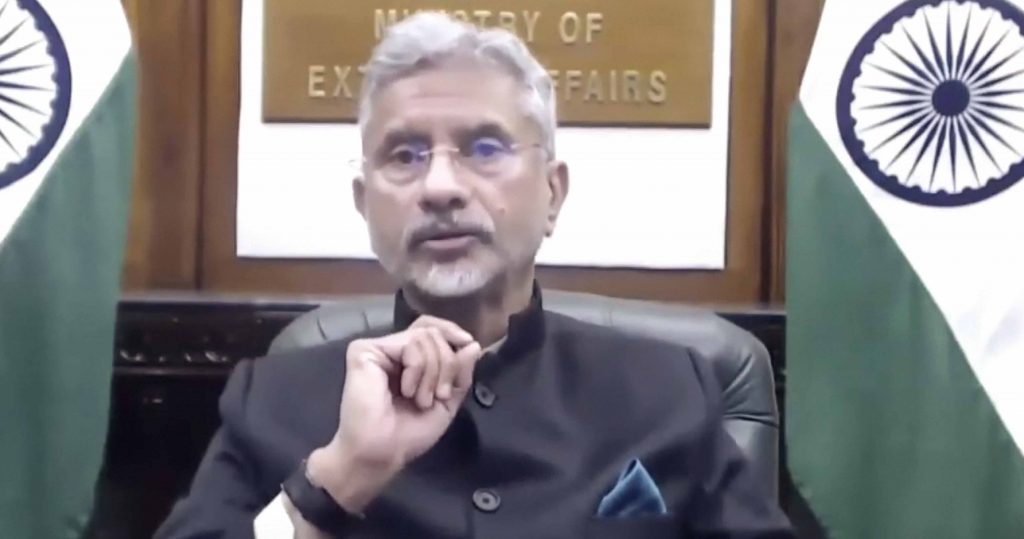Moscow: External Affairs Minister S Jaishankar Friday shared India’s viewpoint on the strategically key Indo-Pacific with his Russian counterpart Sergey Lavrov and sought a “more active” Russian “presence and participation” in the region as something very important.
A day after he talked at length about the Indo-Pacific to experts at the Primakov Institute of World Economy & International Relations here, Jaishankar said he explained to Lavrov how India sees the evolving situation in the region.
“From my side, I shared our view-point on the Indo-Pacific. We support cooperation that reflects the multi-polar and rebalanced character of global politics,” he said in his opening statement at a joint press conference here with Lavrov, who has previously opposed the QUAD grouping between the US, India, Australia and Japan, amidst China’s aggressive actions in the Indo-Pacific region.
“What I told Minister Lavrov, which I repeat to you is, we are very much committed to the centrality and unity of the ASEAN and we believe that the Indo-Pacific Oceans Initiative which we tabled at the East-Asia Summit is very important for the larger region.
“We of course because of our larger geo-political compatibility with Russia, we see a more active Russian presence and participation in the region as something very very important,” Jaishankar, who is on a three-day visit to Russia, said.
In his address to the Russian think-tank on Thursday, Jaishankar said that changes in the capabilities and interests of major players naturally lead India to reassess the global arena.
“Whether it is Europe, the Middle-East, Africa, Eurasia, the Arctic or the Indo-Pacific, new developments have re-defined our understanding of the landscape, as also of its risks and opportunities. None of us can afford to be in denial of these shifting realities. After all, international relations can never be change-proofed,” he said.
If there are enhanced capabilities in some cases or contractions in others, strategists and diplomats need to adjust their calculations accordingly. That is certainly the case with the Indo-Pacific, whose disconnection was an outcome of a certain moment of history, the minister said.
“For a nation like India that now sees much of its trade eastwards, we must look beyond such anachronisms. Both our interests and our reach today extend well into the Pacific. Our major partners are located there, and indeed, cooperation with the Russian Far East is one notable example,” he said.
The reality is that there is a vast global commons whose safety, security, ecology, environment and activities are increasingly a shared responsibility.
“For those who wish to better understand our thinking, I would refer them to the Indo-Pacific Oceans Initiative that Prime Minister Modi announced at the East Asia Summit in 2019. The ability of India and Russia to work together is facilitated by our shared belief in the centrality of the Association of Southeast Asian Nations (ASEAN),” he said.
Later, while answering a question on the Indo-Pacific, Jaishankar described the Indo-Pacific strategy as a further advancement of its Act East Policy and said Russia can make its full contribution in the strategically important region.
“In many ways Russia is there. If Russia acts like Russia, it will make its full contribution,” he said.
Jaishankar, who described Russia as a Euro-Pacific power, was asked which role Russia could play in the Indo-Pacific region.
Indo-Pacific means that it is no longer practical to draw some line somewhere and say this side of the line is different and that side of the line is different, Jaishankar said, adding that in one way it’s something new, in one way it’s something old.
“When I look at India 25 years earlier, we started Look East, it matured into Act East. Today Indo-Pacific is further advancement of it. What has changed in this period? Today our top trading partners include China, Japan, Korea, Russia of course, Australia, ASEAN,” he said.
“Both our interests and our reach today extend well into the Pacific. Our major partners are located there, and indeed, cooperation with the Russian Far East is one notable example. The reality is that there is a vast global commons whose safety, security, ecology, environment and activities are increasingly a shared responsibility,” he said.
“I think beyond a point we should not get caught up in these very semantic debates, terminological debates,” the minister added.
India advocates a rules-based Indo-Pacific with freedom of navigation, open connectivity, and respect for the territorial integrity and sovereignty of all states.
Russian Foreign Minister Lavrov, who has been critical of the Indo-Pacific concept, in December accused the US-led West of attempting to “undermine” Moscow’s close partnership and privileged relations with India.
Lavrov said the West is seeking to reinstate the unipolar world order that would include all states but for Russia and China with which it would deal later.
The US, Japan, India and Australia had in 2017 given shape to the long-pending proposal of setting up the “Quad” or the Quadrilateral coalition to counter China’s aggressive behaviour in the Indo-Pacific region.
The US says Quad is not an alliance but a grouping of countries driven by shared interests and values and interested in strengthening a rules-based order in the strategically-important Indo-Pacific region.
China, which is opposed to the formation of the Quad grouping, is engaged in hotly contested territorial disputes in both the South China Sea and the East China Sea. China claims sovereignty over all of the South China Sea. Vietnam, Malaysia, the Philippines, Brunei and Taiwan have counter claims.
China has also built up and militarised many of the islands and reefs it controls in the region. Both areas are stated to be rich in minerals, oil and other natural resources and are also vital to global trade.
PTI
